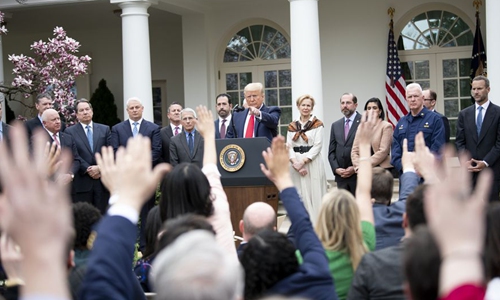HOME >> OPINION
US should save us from ‘globalization shock’
By Wang Wen Source:Global Times Published: 2020/3/16 17:28:40

US President Donald Trump attends a news conference at the White House in Washington D.C., the United States on Friday. Photo: Xinhua
I never imagined the scenario I described in my previous column "Virus fight offers cooperation opportunities" has become a reality so quickly. As the pandemic strikes the US, I sincerely hope Americans can keep safe, and the US government can attach the utmost importance to the outbreak. I now call on the entire world to unite.
Over the past two months, more than 1 billion Chinese people have cancelled family gatherings and all social events, large and small. They have united as one and are approaching a final victory in the fight against the COVID-19 outbreak. The US government, media and people on the other hand appear to have thought little of the epidemic while it ravaged China, and squandered more than a month's forewarning.
US President Donald Trump has finally woken up to reality and declared a national emergency. The US is a superpower with rich crisis management experience, sufficient medical resources and adequate scientific and technological strength. As long as these are fully mobilized, I believe that the US will defeat the virus as China has done.
As a Chinese scholar, I have been keeping a close eye on the spread of coronavirus since its onset, and I would like to make three broad suggestions to the people of the US.
First, US society needs to attach great importance to the deadly virus. Do not assume a leaving-things-to-chance attitude. Do not assume that the mortality rate will be low. Do not accept that only the elderly will fall ill. Anyone can be a victim, or a source of infection, because no one is immune. Don't expect effective drugs and vaccines to be developed soon. Do not gamble with the so-called herd immunity. Stop complaining about "freedoms" being compromised. Nothing ranks higher than life and health. Ten million brave and patient Wuhan citizens have collectively fought the epidemic by staying at home for a stultifying two months. They have shown a tremendously mature attitude.
Second, the US people should recognize that the coronavirus is a formidable enemy of all human kind. It makes no sense to place blames on a country or a culture or a cuisine, or accuse others of being the source of the virus. Some US elites have stooped so low as to call China a "virus" and a "real sick man," and some have even asked China for an apology. This has offended, saddened and irritated the Chinese people. The US should act like a wartime leader and call for international summits on disease control, unite the leaders of all major powers to spur emergency cooperation and share all medical data and resources.
Third, strengthen new global governance rules on international integrity and cooperation. China is grateful to all countries, regions and enterprises that have helped China over the past two months. Now that the situation in China has improved, China is offering donations to other countries and regions. China is sending medical material assistance and medical experts to help countries where the epidemic is still spreading, such as Iran, Italy, South Korea, Japan and France. The Chinese people have more than 5,000 years of continuous traditional culture, and we know how to live in peace with the outside world and to resolve conflicts in an equitable manner. As the youngest global power, the US could also do this. If the US ever needs China's help, it only needs to ask.
What concerns me a lot is that globalization is in shock. The current global flow of personnel, materials and funds has declined sharply, far exceeding the efforts of anti-globalization forces in history. The US stock market plummeted, ending an 11-year bull market and incinerating some $13 trillion in stock market wealth. This reflects an unprecedented panic in capital markets.
The current global shock may lead to the world's worst year of economic growth in the past 40 years, eclipsing the 2008 financial crisis. As the 2001 Nobel laureate Joseph E. Stiglitz said in his book Globalization and Its Discontents, globalization has displeased people in many countries. Now that globalization is in shock, no one will benefit from it.
Former US assistant secretary of state for East Asian and Pacific affairs, Kurt Campbell has warned that 9/11 attacks, the global financial crisis (2007-09), and now COVID-19 are the three biggest crises the US has faced since the Cold War. What will happen to the world if the global industrial chain, supply chain and service chain that have formed over the past centuries remain in shock? This is what the US, China and the entire world need to contemplate.
Canadian author and social activist Naomi Klein said in her book The Shock Doctrine, "Believers in the shock doctrine are convinced that only a great rupture... can generate the kind of vast, clean canvases they crave."
I look forward to a better world and better China-US relations after the global shock season of 2020 finally comes to an end.
The author is professor and executive dean of Chongyang Institute for Financial Studies at Renmin University of China, and executive director of China-US People-to-People Exchange Research Center. His latest book is Great Power's Long March Road. wangwen2013@ruc.edu.cn
Posted in: COLUMNISTS,VIEWPOINT